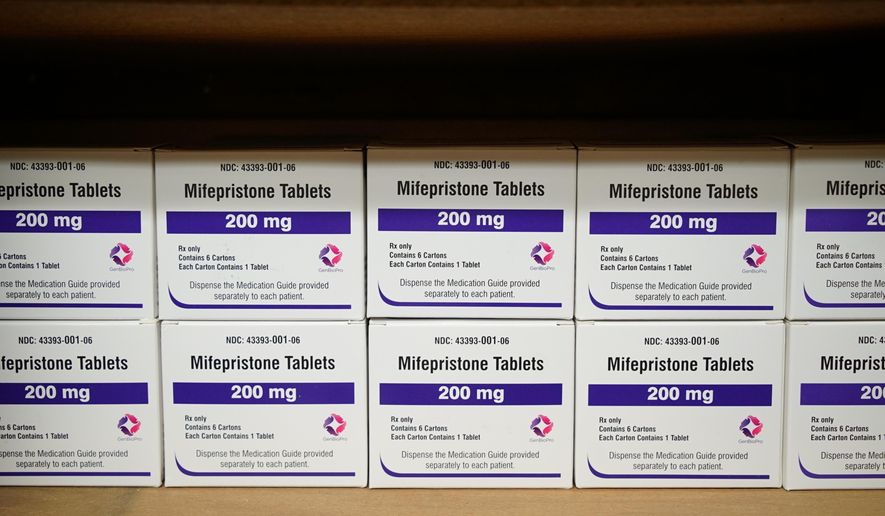Foes of the abortion pill are taking their fight to court, accusing the Food and Drug Administration of placing “politics over science” when it sanctioned the two-drug pregnancy-termination regimen back in the year 2000.
Four pro-life medical groups and three doctors filed a lawsuit Friday seeking an injunction to block the approvals of mifepristone and misoprostol, alleging that the FDA overstepped its authority and failed to study adequately the drugs’ safety under the prescribed conditions.
“The FDA’s approval of chemical abortion drugs has always stood on shaky legal and moral ground, and after years of evading responsibility, it’s time for the government to do what it’s legally required to do: protect the health and safety of vulnerable girls and women,” said Erik Baptist, senior counsel for the Alliance Defending Freedom, in a statement.
The alliance sued in U.S. District Court for the Northern District of Texas, Amarillo Division, on behalf of the Alliance for Hippocratic Medicine, the American Association of Pro-Life Obstetricians and Gynecologists, the American College of Pediatricians, the Christian Medical & Dental Association, and three physicians.
“[W]e ask the court to hold the FDA accountable for its reckless, unlawful behavior,” said Mr. Baptist.
The lawsuit, the first of its kind, signaled the opening of a new front in the battle over abortion access triggered by the Supreme Court’s June 24 decision overturning Roe v. Wade.
The Biden administration has sought to make the abortion pill more widely available in the aftermath of the ruling. In July, President Biden signed an executive order “to protect and expand access to abortion care, including access to medication that the FDA approved as safe and effective over twenty years ago.”
The Health and Human Services Department said the two-drug regimen, approved for terminating pregnancies of up to 10 weeks’ gestation, represents “a safe and effective option.”
In December, the FDA made permanent its temporary pandemic rule allowing providers to prescribe abortion pills via telehealth and have them delivered through the mail.
NEW LAWSUIT: We’ve sued the FDA over its illegal, reckless, and politically-motivated approval of chemical abortion drugs. ADF attorney Erica Steinmiller-Perdomo explains. ⬇️ pic.twitter.com/PezCYtxgIl
— Alliance Defending Freedom (@ADFLegal) November 18, 2022
The lawsuit argued that the 2000 approval was only possible because the FDA characterized pregnancy as an “illness,” allowing the agency to expedite the process.
“The only way the FDA could have approved chemical abortion drugs was to use its accelerated drug approval authority, necessitating the FDA to call pregnancy an ‘illness’ and argue that these dangerous drugs provide a ‘meaningful therapeutic benefit’ over existing treatments,” the motion said. “But pregnancy is not an illness, nor do chemical abortion drugs provide a therapeutic benefit over surgical abortion. In asserting these transparently false conclusions, the FDA exceeded its regulatory authority to approve the drugs.”
In addition, the FDA failed to study the drugs’ safety under the labeled condition of use, including the impact of hormone-blocking chemicals on adolescent girls, and disregarded “substantial evidence that chemical abortions cause more complications than surgical abortions,” the lawsuit said.
The pro-life Charlotte Lozier Institute said that multiple peer-reviewed studies confirm the risk of severe side effects, including “hemorrhaging, the need for follow-up surgery, and even death.”
The FDA said there have been reports of 26 deaths of women associated with mifepristone as of June 30, 2021, including two cases of ectopic pregnancy resulting in death and several cases of sepsis, or severe systemic infection.
“The adverse events cannot with certainty be causally attributed to mifepristone because of concurrent use of other drugs, other medical or surgical treatments, co-existing medical conditions, and information gaps about patient health status and clinical management of the patient,” the FDA said on its website.
Despite those concerns, the popularity of medication abortion, which typically costs less than surgical procedures, has surged in recent years. In 2020, the pills accounted for 54% of all abortions, exceeding surgical abortions for the first time, according to the Guttmacher Institute.
Charlotte Lozier president Chuck Donovan accused the FDA of being “asleep at the switch.”
“Despite comprehensive data from both the United States and Europe on higher rates of complications and a 500% increase in the rate of abortion pill-related emergency room visits, the FDA until now has remained asleep at the switch,” he said. “I am grateful for ADF’s leadership in challenging the FDA on their profoundly anti-woman and anti-family handling of mifepristone.”
• Valerie Richardson can be reached at vrichardson@washingtontimes.com.




Please read our comment policy before commenting.